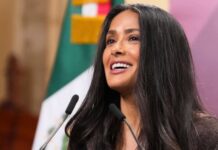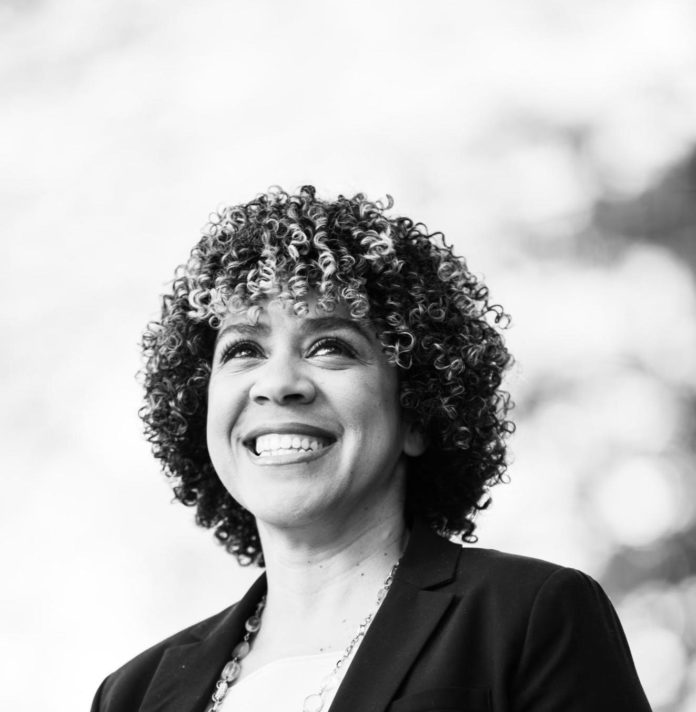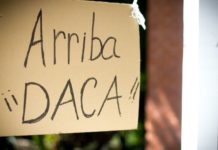New York City’s progressive, Afro-Latina mayoral candidate Dianne Morales is in the same boat as many of her fellow New Yorkers: staying at home, where it’s a tad small for her liking — especially considering there are currently three generations living under one roof.
Last fall, Morales’ parents had sold her childhood home in Brooklyn to make their lifelong dream of relocating to Puerto Rico come true. She had traveled with them to help get them settled into their new home — but literally the day that she was scheduled to return to New York, the first big earthquake struck the island, knocking out their power and water. Morales took stock of the situation and decided to bring her parents back to her place in Brooklyn’s Bed-Stuy neighborhood — where she was raised — to live with her until the chaos died down.
“And then this happened,” she said, both of us heaving a sigh. Morales has been counting her blessings, but it’s been intense. With two college-aged kids living at home now as well — who, by the way, were going in and out of the house delivering meals to homebound seniors until one of their colleagues tested positive for COVID-19 — Morales, a single mother, has been tasked with trying to keep everyone, especially her elderly parents, healthy. “It’s like trying to thread a needle while walking a tightrope,” she explained.
Threading the First of Many Needles in NYC
Her analogy, in a sense, anticipates the herculean task that she’ll face as the leader of New York City if she is to steady the ship through our collective crisis, a crisis that has come down especially hard on New York City.
Though each day presents a different facet of the challenge that lies ahead, I asked Morales what, from her current vantage, she feels will be the right first steps for her as mayor.
In short, she hopes to lay the foundations for economic independence and assistance for all New York City residents, something she feels is key to any plan for recovery.
“There are two things that I think are going to remain constant, although the need might just increase between now and then. One is the need to figure out how to revitalize the economy. I think we need to think about providing grants and loans to small businesses to start to help them get back on their feet,” she said. She cited the fact that very small businesses represent a vast majority — upwards of 90 percent — of over 200,000 private businesses in the city, and that these small businesses employ over half of private sector employees in New York City. By focusing the city’s resources on saving these small businesses, thousands of New Yorkers will have the means to provide for their own needs and for their communities.
As an aside, with all the reading we’ve been doing about how our institutions are leaving behind women-owned businesses, POC-owned businesses, businesses that rely on the skill of immigrants, it’s heartening to anticipate an economic future where a woman of color will be in charge, someone who is sensitive to the needs of everyone in the small business community.
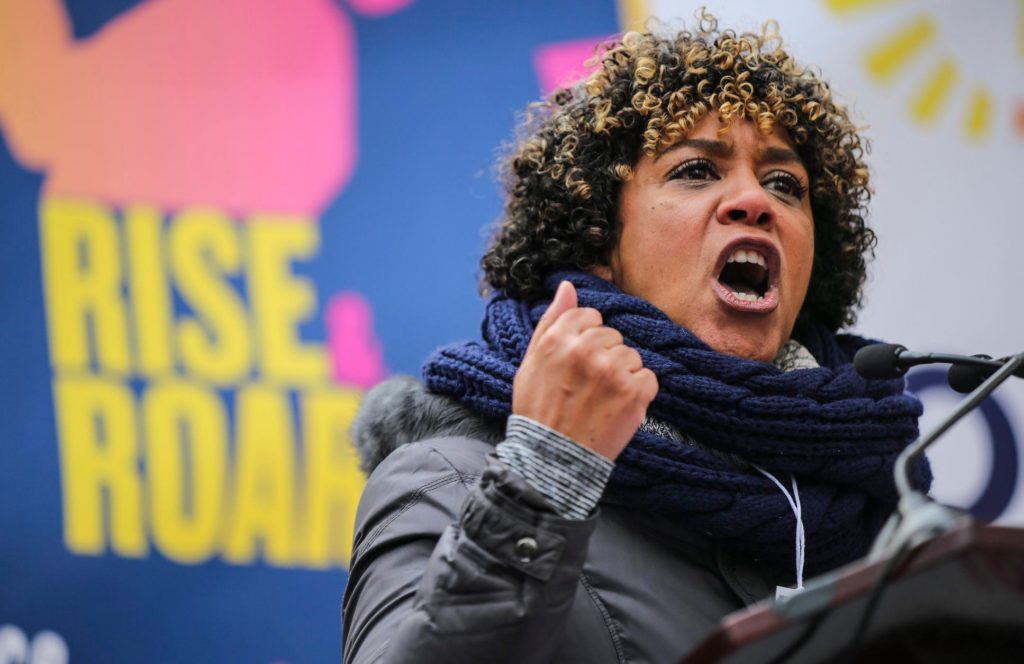
“And then we need to think about how we provide some level of basic income to some of the most marginalized residents so that they, in turn, can provide for their families, and begin moving toward some level of stability,” continued Morales. “I don’t mean to oversimplify them, I understand that there are complexities — but if we start with those two basic human needs, that would provide very solid pillars that we could continue rebuilding from to get back to a better place as a city.”
A Recovery Plan That Moves Us Forward by Reckoning With the Past
Of course, this requires us to reflect on where we were before COVID-19, an era in which many Americans would have benefited from a similar plan to foster resilience within the small business community as well as resilience at home. The COVID-19 crisis, after all, has in many ways simply served to throw gasoline on fires that were already smoldering in communities all over the nation.
Morales highlighted the plight of those who are deemed our essential workers, how we have historically valued — or failed to value — how integral they are to society. “I do feel like the current crisis has exacerbated all of those differences and made it so that we can’t unsee it: the role that immigrants play, the role that women play, the role that people of color play in running the city and keeping it functioning, and yet the irony in that these folks are the very people who are paid the lowest wages, often don’t have access to healthcare or can be struggling to keep a roof over their heads or feed their families, just living one paycheck away from a total financial crisis.”
Her plan for recovery, then, is a recovery from not only the pandemic but also from policies that have long had injustice coded within them, policies that exploit marginalized communities in order to prop up what we now see was a fragile system to begin with.
Morales likened her mayoral vision to that of a new reconstruction. “We need to be thinking about how we learn from this crisis to sort of rebuild toward a really just society that recognizes the value and contributions of everyone in a whole different way, the idea of re-envisioning and reimagining what’s possible if we elevate and give appropriate due to those that have in this moment turned out to be the most valuable for all of us,” she concluded.
Centering Black and Brown Communities Helps Everybody
Even before COVID-19, Morales had centered much of her campaign on the needs of black and brown communities on the premise that “A rising tide lifts all boats,” as she underscored in a recent virtual town hall with activist Frederick Joseph. The two public figures addressed NYC’s economic crisis and touched upon the pressing issue of rent relief in the city. To date, rent is still due this week for all New Yorkers, despite so many people being without a job now or even in the near future.
I asked Morales why an issue like canceling rent should matter to the greater community regardless of whether it affects them directly. In response, she recounted her conception of how interconnected we all are. “Having both worked in the community and for the city during a brief period of time, I think that one of our greatest challenges is our failure to think comprehensively and in an integrated way,” she observed. “We tend to try to resolve challenges and social problems in silos. We tend to think about homelessness. Or we think about education. Or we think about healthcare. The lack of complex, comprehensive thinking about all of this is and planning for all of this, I think, is highly problematic because everything is so interconnected.”
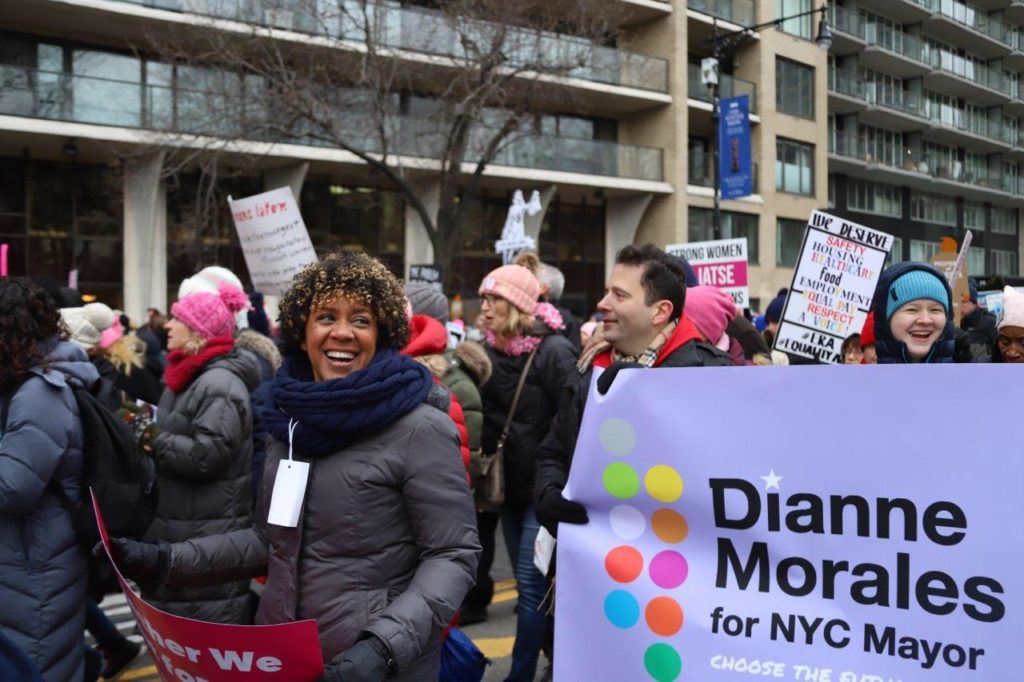
On the issue of affordable housing or canceling rent, for example, she acknowledged how housing is an essential element of human rights, of dignity, and of greater economic stability. “Not only are we talking about displacing thousands of families who are at risk of potential eviction because they can’t pay their rent, but then these people are also the same people who won’t be able to contribute to reviving the economy as consumers,” she explained. “There’s a ripple effect on a family’s ability to thrive, holding a stable job, feeding the family, getting the children to school, not to mention the psychological and emotional impact of instability on everybody involved.”
How interconnected we are isn’t just limited to canceling rent. We spoke on Earth Day, so I asked her about her vision for climate action, something that by nature is intersectional, highlighting how connected we all are; after all, it’s no coincidence that COVID-19 has disproportionately affected groups who are living in the most polluted reaches of the country.
Having worked in the south Bronx, perhaps the most polluted area in New York City, Morales was keenly aware of the ecological circumstances that unleash a ripple effect on the health of the community, on the education of its youth, and beyond. “I worked in the south Bronx for the last 10 years, and the districts that we worked in had the highest hospitalization rates and ER visits for asthma, and that was the single largest reason for absenteeism in the schools that we were working with,” she shared, making sure to tie climate injustice back to the racism and classism that treats these communities as disposable.
The bottom line is that when our most vulnerable neighbors go down, we all suffer; the injustice trickles up. “Whether directly or not or whether we realize it or not, we share that burden and that risk because those people become more dependent on other systems and structures,” Morales said. “So if we can invest on the front end in terms of their stability and their security, they’re much more likely to be better positioned to contribute positively to the community as a whole. And when that happens, we all benefit.” Morales emphasized that a proactive investment is by far more preferable than a bailout or an intervention after we’ve all suffered.
Morales’ Assets as an Insurgent Candidate
This progressive outlook is one of her best assets as a candidate for mayor, so we talked about how the pandemic may make that resoundingly clear, even to voters who don’t consider themselves to be progressive, people who may have historically overlooked these connections or dismissed as personally irrelevant the issues that affect their most vulnerable neighbors. “I do think that this [crisis] has created a window into that ugly reality, and I’m hoping we will seize the opportunity to really fundamentally transform things moving forward,” she said. “And that means thinking differently about who leads and how we allow ourselves to ‘be led.’”
We all have these moments of realization that completely shake up everything we thought we knew about a particular subject. On the subject of leadership, Morales had never aspired to run for mayor. But the 2018 midterm elections were a turning point in how she had viewed who leads. “People have been telling me for years that I should run for office, and I totally rejected that idea mostly because I didn’t fit the stereotype, in my mind, of who most elected [officials] are, what they look like, and how they operate, and I was just like, ‘I’m not going to be that, I don’t want to be that,’” she confessed.
“I think after the last presidential election, when we saw the wave of what happened across the country and the women that stepped up, the squad… I started to think ‘Wow, that might be possible!’” I confessed my own guilt over being surprised when progressive young candidates, women, people of color, have the power to unseat a longstanding, typically white and male, incumbent.
Morales shared with me her optimistic outlook. “We might have reached a sort of tipping point where if enough of ‘us’ are bum-rushing the system, that a few of us might actually make it through. And that if we get enough of a critical mass of us on those positions, that that’s where we can really get to the place where structural and systemic reform are possible.”
Morales may only recently have had the revelation that she could see herself leading New York City, with a game plan informed by her deep experience working with and leading community-oriented organizations, influenced also by her own lived experiences as a single mother, a woman of color, a first-generation college graduate, an educator. But she shared that her nontraditional, insurgent run for office could be traced to the influence of her mother.
“My mother was the pioneer on this for me. She’s an only child, she came here from Puerto Rico as a pre-teen with her mom, she sort of broke all the gender norms for a Puerto Rican girl at the time. She was fiercely independent, she just bucked those traditional roles, and I think that watching her as I grew up was part of what gave me the courage from a young age to pursue my own path, even as the youngest — I’m the youngest of three,” she said. Bucking her own perceived or real limitations, then, is a living inheritance from her biggest female role model. Morales’ youngest kid is now involved in the social media of her campaign. “She was the one who actually started my Tik Tok account…”
Running for mayor now, Morales is still getting used to her new public role as a role model. She recalled a memorable experience from the fall where, at a conference, she was approached by a young woman and her peers. At this point, she was still getting used to being recognized by strangers, so she was caught off guard when the woman recognized her as a candidate for mayor. “[She said,] ‘I just want to tell you how amazing it is to see someone that looks like me running and how inspiring you are to me.’” The woman’s peers then stepped forward too, excited to shake Morales’ hand.
“In that moment, I just felt an incredible sense of pride, but also an incredible sense of responsibility in terms of representing my communities that way; whether you want to or not, you end up becoming a symbol for a larger community and I take that really seriously,” reflected Morales. “It is a tremendous honor and privilege, and the fact that they were proud of me and felt like it was special for them to get to meet me… meanwhile, I feel like it’s so special for me to have support from them! It was an indelible moment that will stay with me for a long, long time.”

It’s these interactions that have moved Morales the most and kept her inspired through what is a historic campaign, on all fronts. She acknowledges being dismissed by the political establishment, including “the political reporters or the talking heads of the elected officials” who felt her lack of political experience would lead to her undoing. “But then there’s the ‘average New Yorker’ who has more experiences in common with me than not,” emphasizes Morales.
These folks, she explains, are potentially the critical mass in making her campaign a successful one. “I think people are ready to be represented by someone who they feel understands their lived experience and has been there. And that’s been really affirming to me. I think that I wasn’t expecting that kind of resonance, if you will, but it’s been really powerful to just hear people and see the light in their eyes when they make that connection and have that realization.”
Morales’ campaign, as a grassroots effort — she’s not taking money from corporate PACs or the luxury developers who exacerbate issues surrounding affordable housing and gentrification in the city — will rely heavily on small donations from these very same New Yorkers (and, of course, from supporters all over the nation who are rooting for NYC) as well as the enthusiasm from campaign volunteers who connect with her vision.
But in the immediate wake of the pandemic, Morales has been directing her energy and resources not to her campaign but to supporting the vulnerable members of her community. “We’ve done town halls to help provide information to the community. We’ve been doing wellness calls where we’re reaching out to neighbors to check in on them both to help combat social isolation but also to connect them to resources.” Her team actually assembled one of the most comprehensive resource pages available in New York City for how to get support or aid.
In essence, she’s already demonstrating effective leadership rooted in organization and compassion, and her influence and message has been traveling organically through the community, through word-of-mouth interactions.
“I’ve gotten to the point now where I’m getting calls on my personal cell phone from residents in the community who are homebound and need help,” said Morales, laughing. “I have no idea how my number got out! And it doesn’t really matter. But I’ll get a call that’ll say, ‘Oh, you know, one of the sisters from the church told me that you helped them and I was wondering if you could help me too.’ To me, that’s so much more valuable than any other sort of campaigning that I could be doing, and it’s just true to who I am as a person. So if that’s how we do this, then great — because it is in perfect alignment with how I think leaders and elected should be leading anyway.”
By the way, every dollar donated by New York City residents gets matched 8 to 1, so a $10 donation, for instance, turns into $90 for her campaign — so, as I like to think of it, for the price of a mediocre glass of wine, you’re magically get a bottle of fine champagne. To get involved in the conversation and learn more about Morales’ campaign, visit her homepage and stay tuned for more town halls on her IG @dianne4nyc.
For Image credit or remove please email for immediate removal - info@belatina.com





